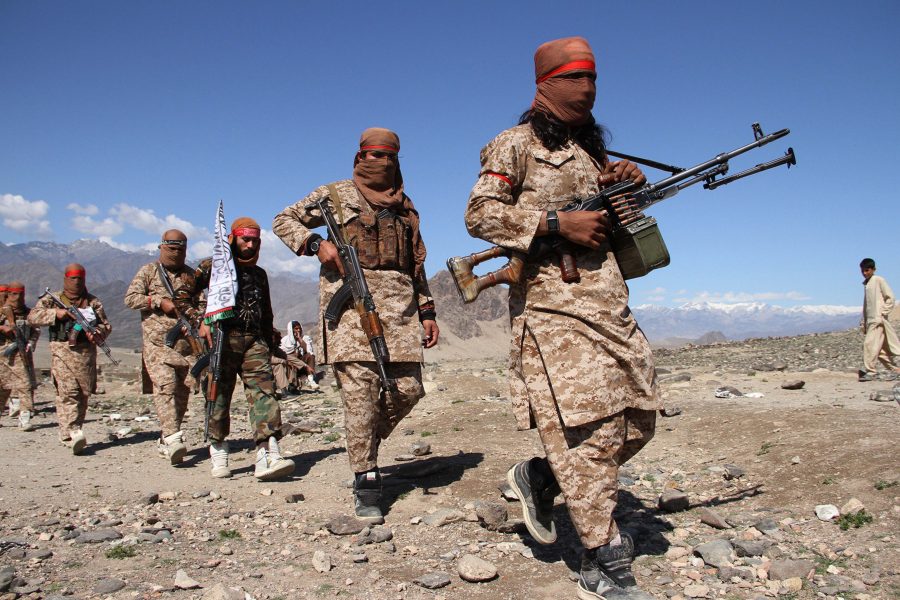On Saturday, the Afghan Taliban tightened their territorial grip on Kabul, as refugees fleeing the militants’ unrelenting assault entered the city and US Marines returned to Afghanistan to supervise emergency evacuations.
Kabul has essentially become the besieged, final stand for government troops that have provided little or no resistance elsewhere, while the country’s second and third largest cities have fallen under Taliban control.
Insurgent forces have set up camp only 50 kilometres (30 miles) away, forcing the US and other nations to scramble to transport their citizens out of Kabul in advance of a predicted all-out attack.
Heavy combat was also reported in the area of Mazar-i-Sharif, a remote outpost in the north where warlord and former vice president Abdul Rashid Dostum had assembled his anti-Taliban force.
Jalalabad, Gardez, and Khost — all Pashtun-dominated and unlikely to provide any opposition now — were the only three cities of any importance that had not yet been captured.
As the first American troops from a planned 3,000-strong re-deployment arrived in Kabul to protect the airport and oversee evacuations, embassy staff were instructed to begin shredding and burning sensitive material.
On Friday, a number of European countries, including the United Kingdom, Germany, Denmark, and Spain, announced the evacuation of staff from their embassies.
The prevailing tone among Kabul residents and the tens of thousands who have sought shelter there in recent weeks has been one of confusion and fear.
According to UN Secretary-General Antonio Guterres, reports of terrible treatment of women in Taliban-controlled regions have him “very concerned.”
UN Secretary-General Antonio Guterres said he was “deeply disturbed” by accounts of the poor treatment of women in areas seized by the Taliban.
The Taliban’s size and speed have astounded Afghans and the US-led coalition that spent billions into the country after defeating the Taliban almost two decades ago in the aftermath of the September 11 attacks.
Individual Afghan troops, groups, and even whole divisions have surrendered only days before President Joe Biden orders a complete US departure, giving the insurgents even more vehicles and military gear to fuel their rapid assault.
Despite the frantic evacuation attempts, the Biden administration maintains that a total Taliban takeover is not a certain conclusion.
“Kabul is not right now in an imminent threat environment,” Pentagon spokesman John Kirby said on Friday while acknowledging that Taliban fighters were “trying to isolate” the city.
The Taliban assault has picked up steam in recent days, with the takeover of Herat in the north and Kandahar — the group’s spiritual stronghold in the south — only hours apart.
Abdul Nafi, a Kandahar local, told AFP that the city was quiet after government troops left for the safety of military installations outside, where they were discussing capitulation conditions.
He added, “When I got out this morning, I noticed Taliban white flags in most of the city’s squares.”
Pro-Taliban accounts on social media have bragged of the rebels’ enormous spoils of war, sharing pictures of armoured vehicles, heavy weaponry, and even a drone taken from abandoned military facilities.
Long-time strongman Ismail Khan, who helped lead the defence of the province capital with his militiamen, was seized by the Taliban in Herat.
On Friday, the Taliban took control of Pul-e-Alam, the seat of Logar province, bringing them within striking distance of Kabul.
Helicopters flitted between Kabul’s airport and the vast US diplomatic complex in the highly guarded Green Zone, 46 years after choppers rescued Americans from Saigon, signalling the end of the Vietnam War.
Thousands of individuals, including embassy workers and Afghans and their families, are being evacuated by the US. They are afraid of retaliation for serving as translators or in other support roles for the US.
Most of the soldiers overseeing the evacuation will be in place by Sunday, according to Pentagon spokesperson Kirby, and will be able to “move thousands per day” out of Afghanistan.
“Capacity is not going to be a problem,” he said.
Read more: https://pakobserver.net/international/










